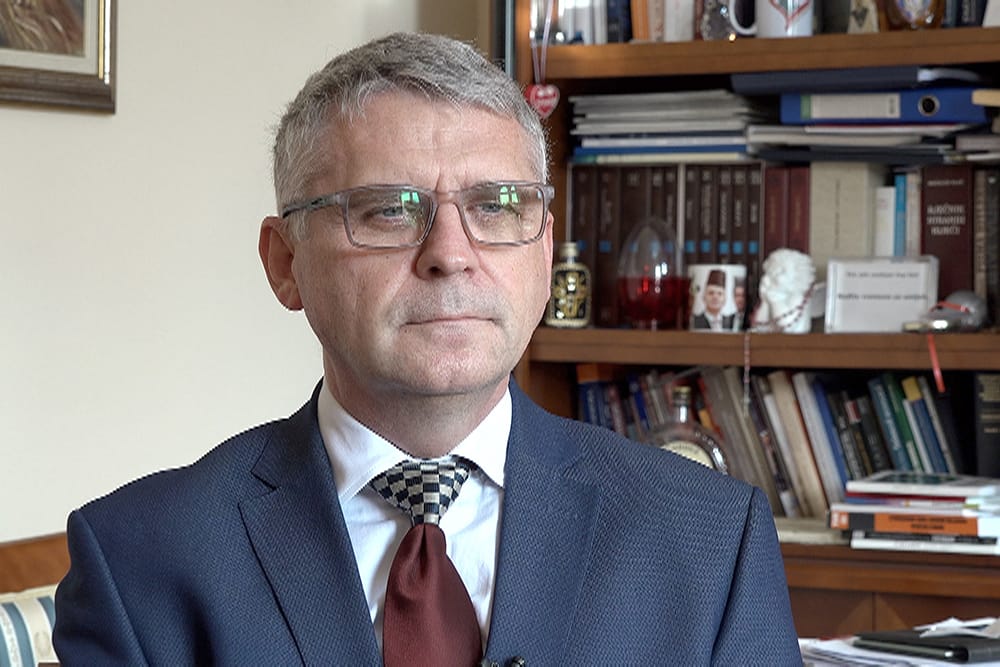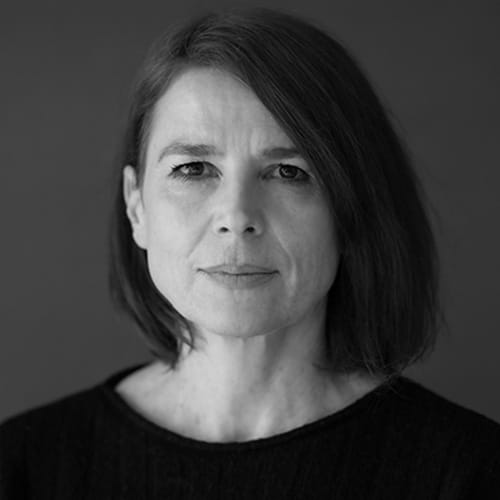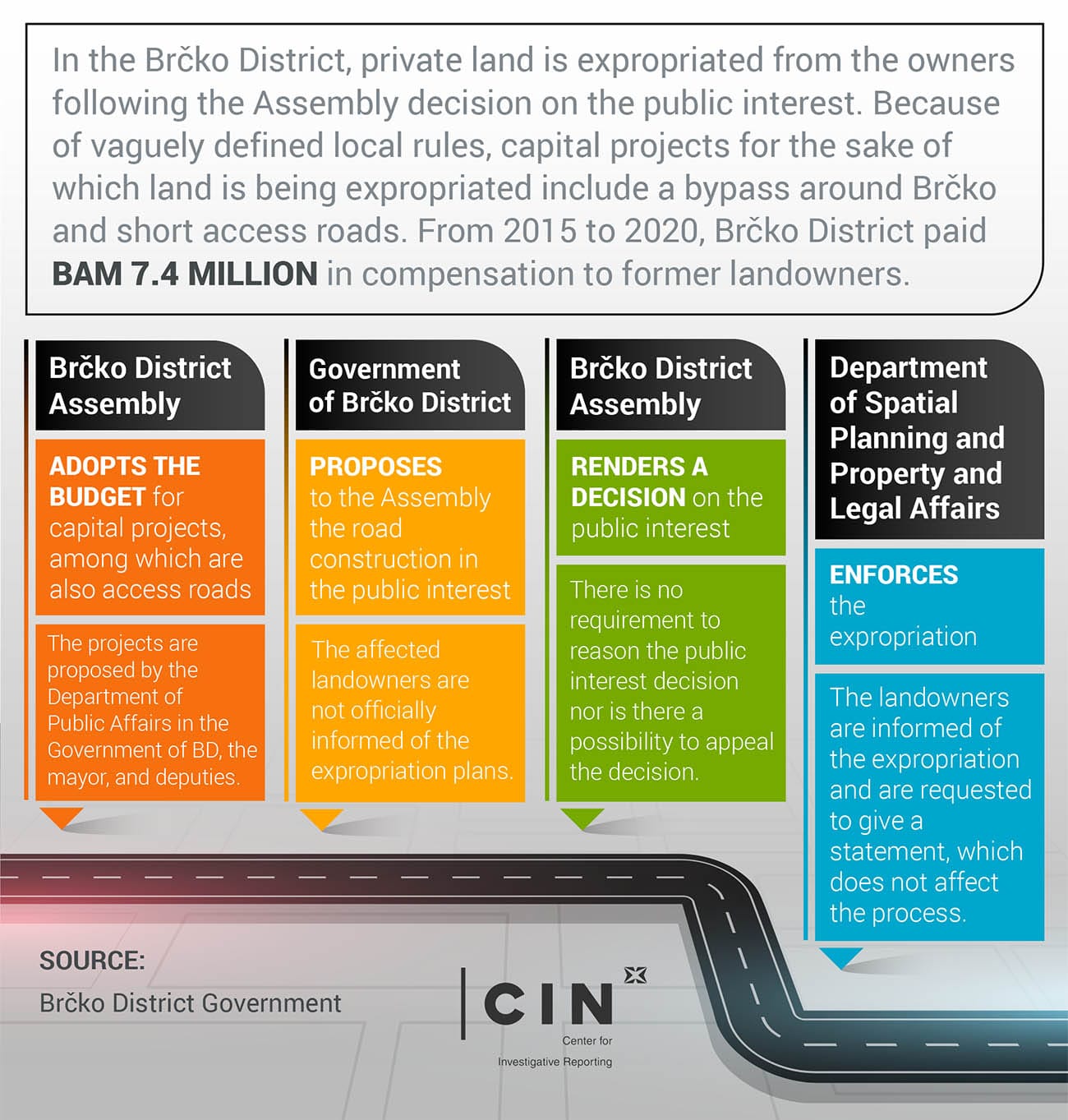In the spring of 2018, the Assembly of the Brčko District decided that the paving of the road leading to the family house of Deputy Mayor Ante Domić in Skakava Gornja is in the public interest. The route of the road goes through the land of his cousin Filip Domić, hence expropriation was initiated to take it away from him and turn it into a public good. Filip protested, trying to prove that building the road is not in the public but the private interest.
And he was not alone. Both Bogoljub Mićić from Ražljevo and Miloš Milić from Brezovo Polje Selo are fighting to keep the land that the authorities are taking away from them to build access roads to the houses of members of political parties and loyal voters.
Under the Land Expropriation Act of Brčko District, private land shall be expropriated from the owners based on a decision of the Assembly – rendered at the proposal of the Government – declaring that the construction is in the public interest. The Act does not require the institutions to reason such a decision, nor does it allow citizens to appeal it. Moreover, the Act does not require the ower’s consent for expropriation either.
“Here is the thing: it can be clearly seen and inferred that the decisions on the public interest rendered at the Assembly are being abused for the sake of someone’s private interests under the guise of public interest”, says lawyer Milenko Marjanović.
Domić against the system
Filip Domić is the owner of a land parcel that stretches along the main road in Skakava Gornja. A macadam road crosses the parcel leading to the land and family house of his cousin Ante Domić, deputy mayor and president of the Croatian Democratic Union (HDZ) of the Brčko District. In the house lives Anto’s brother Niko with his family.

The Domić cousins used to be very close. They grew up together and lived together during their schooling, and they had a verbal agreement to use the macadam road unhindered. In mid-April 2019, Filip went to the Brčko District Administrative HQ to make a written consent on the use of the road only to find out that the Government is intending to take away his land.
“It was unclear to me, and strange. I thought to myself, this is not what I’ve agreed with Anto”, Filip recalls. He tried to call him and find out what it was all about but in vain.
CIN revealed that four years earlier, Anto Domić, who was the mayor at the time, proposed that BAM 15,000 be allocated from the budget for the construction and tarmacking of the road leading to his family house in Skakava Gornja. The deputies supported the mayor’s amendment, so the 160 meters long and four meters wide road ended up on the list of capital projects.
The Department for Public Affairs of the Brčko District then started implementing the project, asking the competent institutions to collect the documents necessary for the construction. The Government of the Brčko District sent the collected material to the Assembly deputies, who in mid-April 2018 unanimously decided that the construction of the road is in the public interest. They did not explain what the public interest was. This opened the way for the expropriation of private land on the road route.
It was then that Filip Domić received the first official information about the construction plans. He objected to expropriation, claiming that the road was not of public but private interest and that his relatives also had alternative access to their house, but it was all in vain. Namely, in October 2019, the Government Department issued a decision on the expropriation of land because the objection of the owners does not stay the process when there is a public interest decision.
“I don’t know how would we build anything if we were to ask [them, the owners]”, said Ivo Filipović (HDZBiH), deputy speaker of the Brčko District Assembly to CIN journalists.
He says that the material for the decision on the public interest goes through the several institutions of the Government and the Attorney General Office before it is presented to the Assembly: “I don’t want to question it, I want to trust the institutions.”
Filipović explains that the deputies pass decisions determining the public interest mostly without debate, and claims to not know the locations of the roads which they are voting on. Although he is from the neighboring Skakava Donja and the same party, Filipović claims not to have known that the disputed road would go to Domić’s family house, but even if he did, he would vote the same.

Deputy mayor Domić did not want to talk to CIN journalists.
His brother, Niko Domić, claims his family lives in difficult conditions. Meanwhile, Filip Domić completely banned the passage across his land by placing iron ramps, so Niko’s family has to cross a creek to get to the main road. For Niko, the existing macadam road they used is not a permanent solution, especially not in winter.
“Three or four times, I would get up in the morning to clean the road to be able to get out. I wanted to have a tarmac road,” explains Niko, adding that with the paved public road comes winter maintenance and lighting and that the construction of the road is thus in the public interest, regardless of whether it is used by a million inhabitants or a single person. “It’s all the same, ma’am,” said Niko to CIN journalist.
The Land Expropriation Act in the Brčko District does not clearly define the notion of public interest or the procedure for determining it. “For something to be declared public interest, it should serve, as a minimum, the interests of more citizens and not just one person or one family”, says lawyer Darko Milićević, who represents Filip Domić.
Unlike Entities where citizens are allowed to appeal public interest decisions, in Brčko District this is not possible.
Lawyer Milićević says that the Land Expropriation Act in Brčko creates room for abuse. “Such legal regulations enable someone who has the political power to expropriate anyone’ property by having the Assembly declare it in the public interest, whereas, in fact, it is not at all in the public interest.”
At the end of April 2020, Milićević sent a request to the Court of Appeals in Brčko seeking the review of the compliance of the Act with the Statute of the District, which stipulates that no real estate can be expropriated without the consent of the owner. Based on that, in October 2020, the Court annulled the decision of the Assembly with the explanation that the owner of the real estate should have been involved in the process.
With this decision, the whole process went back to the beginning, but Filip Domić’s objections had no impact on the decision this time either.
“I have no one to turn to and explain how I feel”, he told CIN.

Through amendments to voters
By August 2021, the District Court of Appeals annulled two more decisions declaring the public interest in the construction of roads through the property of Bogoljub Mićić from Ražljevo and Miloš Milić from Brezovo Polje Selo.
Bogoljub Mićić is the co-owner of the land, which is supposed to accommodate the road 257 meters long and four meters wide leading to his and the house of his uncle Ilija Mićić. To build this road, Bogoljub’s fence and well would need to be removed, which he finds unacceptable. He is aware that the decision of the Court of Appeals only saved his land for a short time. As he says, he had spent money on a lawyer, lost time and nerves, but did not stop the expropriation process.
Had he been in the Assembly when they passed the decision on public interest, he says he would have asked the deputies to explain to him how was this in the interest of the Brčko District Government. “If you can explain it to me, feel free to do whatever you like, bring down my house, if you will.”
The decision on the public interest was made in September 2019, and Mićić claims not to have known about it until the expropriation took place: “They put me on the spot. They virtually called me to sign the paper and hand over the land to them.”
Mićić’s lawyer Milenko Marjanović says that the initiative towards the Court of Appeals was the only thing they could do: “It is a widespread practice in the Brčko District to have roads built – under the guise of some public interest – in places where politicians have their real estate.”
Grujica Kisić, a member of the Alliance of Independent Social Democrats (SNSD) in Ražljevo, confirmed for CIN that Mićić’s uncle Ilija is his party colleague and that the road to his house is one of the two unpaved roads in the village. Kisić claims that Mićić through his party colleagues in the Assembly made the initiative to pave the road, for which purpose an allocation of BAM 15,000 was made in the budget.
“Understand that not a single road was tarmacked in Brčko without party support! Everyone has someone to tell them which road is next to be tarmacked”, says Kisić. As for the road tarmacking as public interest, he explained it as follows: “So they would not get their shoes muddy.”
Ilija Mićić did not want to talk to journalists.
An average of BAM 7.4 million is planned annually in the District budget for the implementation of about 300 capital projects. Among them are access roads of only a few hundred meters in length. These projects are proposed by the Department of Public Affairs in the Government of BD, the mayor, and deputies through budget amendments.
Vukašin Panić, a former deputy and SNSD member explains it as “a way to get the votes of citizens”.
In 2016, Panić submitted an amendment to the budget based on which BAM 12,000 was allocated for tarmacking the road 81 meters long and three meters wide. It was a dead-end street that leads to the house of Senka Milić and her husband Ostoja Zec, the Panić’s voters in Brezovo Polje Selo.

The route goes through the land parcels owned by Senka and her brother Miloš Milić.
Senka asked Panić to initiate the tarmacking. However, Miloš does not want to give up the land nor does he see any public interest in the tarmacking. It bothers him that everything happened without his consent.
Milić lived in Austria for three decades, and when he retired, he faced a problem for which he sought the help of a lawyer. They refuted the assembly’s decision on the public interest, while other decisions, such as the one on expropriation, are still in force.
Dejan Karan from the Department for Property and Legal Affairs of the Brčko District Government explains that this is an urgent procedure that is carried out after the Assembly decides on the public interest.
“Hypothetically, if you have a majority in the Assembly, you can even make a decision … that today will be a Tuesday in a local community, even though it is Wednesday. The Assembly may decide that today is Tuesday. It sounds unreasonable, but that’s how it is”, says Karan.
Both the tarmac and money
The Speaker of the Brčko District Assembly, Siniša Milić, says that expropriation in this area has been carried out in the same way for two decades. However, in his view, the overturned public interest decisions point to a problem, and to this end, the Act should be amended. Officials from the Department of Public Affairs claim that these cases were exceptions because people mostly want paved roads, and also they receive compensation for the expropriated land. The amount of compensation depends on the place of property and it ranges from a few marks per square meter in rural to BAM 54 in the urban settlement of Brod.
A 220-meter road was tarmacked in this settlement in front of the family house of Senad Osmanović from the Party of Democratic Action (SDA), who is now a deputy in the Assembly. The road is located on the private land of his close relatives and connects the houses of his aunt and father Hamid. The road was part of the 2014 capital projects, for which the then-mayor Domić proposed the allocation of BAM 25,000.
At the time, Osmanović was a history teacher. He was later appointed Head of the Department of Education in the Government of the Brčko District. He claims to have no connection with the project nor does he know who initiated it.
“Someone simply included it, perhaps, realizing it was good for populating the area. Brod is one of the best-developed settlements, and there are maybe two or three more streets in the entire settlement that are not yet paved”, says Osmanović.
About BAM 62,000 was paid to expropriate 1,152 km2 for the construction of this road. Osmanović’s father Hamid received about BAM 20,000, and the rest went to his relatives.
“That’s the law”, concludes Osmanović.








